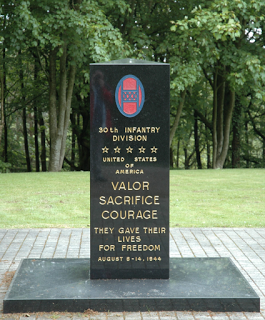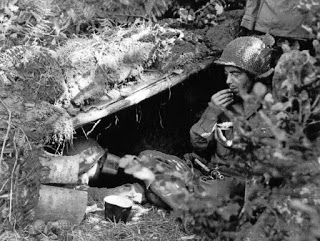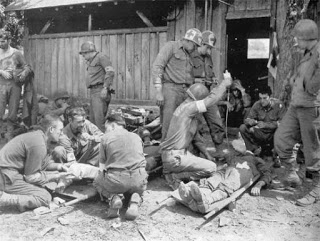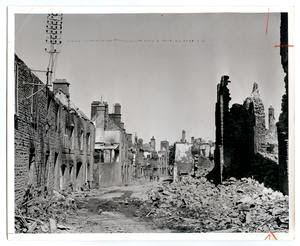Logistics, Necessities and Improvisations
AHC is running a series on "Against All Odds," about desperate fights throughout military history. Among these is the valiant stand of 2nd BN 120 Infantry Regiment at the battle of Mortain, France, in August 1944.
My interest was drawn to one anecdote from that action, so I looked for more details and found it here: 'Operations of the 2nd Battalion, 120th, 30th Infantry Division) at Mortain, France (Personal Experiences of a Company Commander)' by Major Ralph A. Kerley.
There are three points in this report that bear mentioning with relevance to today. The first is that there are some things that cannot be substituted for. On Hill 314, after the battalion was cut off, that essential item was radio batteries. According to the AHC documentary there was one artillery forward observer who had laid in an extra supply of radio batteries and in the end it was the only way the battalion had of communicating with the supporting artillery which in the end saved the position after the infantry had pretty much run out of ammunition.
By the end of the second, Kerley reports:
The last of the K rations were consumed at noon, ammunition was dangerously low and the evacuation of dead and wounded was impossible. This was one of the most serious problems confronting the company commanders. Communication with regiment was entirely by radio, and this contact was sporadic. Regiment was requested to supply by air some food, ammunition and medical supplies.
On the third day:
The 8th of August was fairly quiet. The enemy made no serious attempt to take the position. He continued his attack, by-passing the HILL #314. The observers on the Hill #314 had all round observation and made the most of it. The enemy supply lines and rear areas were constantly harassed by our artillery. The serious problem of food, ammunition and medical supplies still confronted the battalion. Radio batteries were rapidly weakening. In an effort to conserve the batteries, only one company turned on its radio at a time, with the exception of calling fire missions. Orders and information received from regiment was disseminated to the companies by patrol. . .
On the fourth day:
Attempts by the regiment and the remainder of the division to relieve the battalion had failed. The first gnawing pains of hunger and thirst were appearing. The ammunition supply had dwindled to practically nothing. Several of the severely wounded died during the night. . . In an effort to relieve the situation, supplies were loaded into two of the division by faster aircraft. Division tried next to schedule a flight of C-47’s for the supply mission. Finally, after four requests were made through slow moving channels, a flight was scheduled for 10 August. This information was relayed to the besieged men, but due to past unpleasant experiences with close supporting air, there was some doubt of success in the minds of the men. The enemy had no doubt been monitoring our radio and knew the existing situation.
Foxhole on Hill 314.
This was immediately followed by a German surrender demand, It was obscenely refused.
True to their promise, the enemy launched a strong attack at approximately 2015 hours. The battalion ammunition supply was so low, the enemy encountered little resistance other than our artillery. After the enemy had penetrated the position, the E Company Commander called artillery on his own position. This broke up the attack and the enemy took a severe beating. This success served as a ‘shot in the arm” to the sagging morale of the men on the Hill.
The survival of all the men on the hill had rested on the flickering of just a few radio batteries. Today's technology rests even more on portable power systems, especially batteries. Lesson One: Batteries are an indispensable item as much as ammunition. Yet there are many of us who are careless about this vital logistical element of success.
Lesson Two: Careless communication arms the enemy. This is so obvious it should not require explanation.
Kerley also provides a third lesson: Improvise, adapt and overcome. The air drop scheduled for the 10th was a partial failure:
Approximately one half of the drop landed far into the enemy lines, but at least, the battalion had some food, ammunition and a limited amount of medical supplies. One of the most important items contained in the drop was radio batteries. A report was made to regiment of the drop and an attempt to schedule another drop was made, especially for medical supplies. In the meantime, the S-3 of the 230th Field Artillery Battalion had an idea to relieve the situation. Ten rounds of M-84 (base ejection HC smoke)) ammunition were opened, and the smoke canisters and base ejection charge removed. The rounds were then filled with medical supplies, bandages, dressings, sulfanilamide and morphine syrettes. The steel disc in the nose was replaced to prevent the fuze, when detonated, from ruining the contents. Four other shells were treated likewise, and were filled with sand to approximately the same weight. These rounds were to be used for adjustment. The S-3 then made his intentions known to the men on the Hill and gave instructions for opening the projectiles. The adjustment was completed at approximately 2130 hours, and the medical rounds were then fired. None of these rounds were recovered due to ricochets and darkness. Even though the medical supplies were badly needed, the presence of food and ammunition served to raise morale to a new high. As soon as the mist lifted on 11 August, the artillery again attempted to fire in medical supplies. Six rounds were fired and all were recovered. This operation was only partially successful, however, the concussion being too great for the containers of the morphine and plasma.
Kerley's account (as with all military history) should be read for such universal lessons. -- Mike
105th Medical Battalion Aid Station (30th Inf Div) established in the vicinity of Mortain, treating casualties after the battle, Mortain, France, August 1944
Mortain after the battle.




3 comments:
Awesome write-up and great points. Thanks for this!
My grandfather was in the 30th, 118th BN(I think)
The real lesson here is that you always want to have artillery support.
I saw it and wasn't, until I did, aware of this particular WWII History. Make every effort to make the kids and grandkids watch this too.
Post a Comment